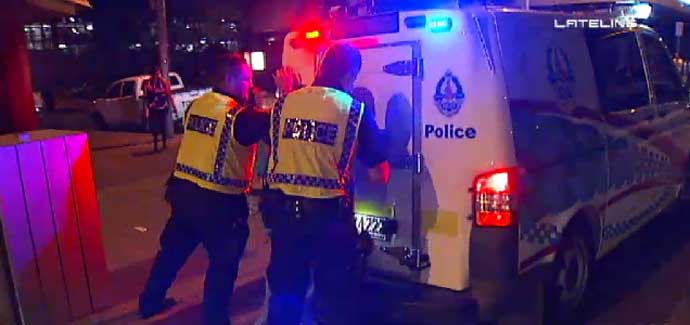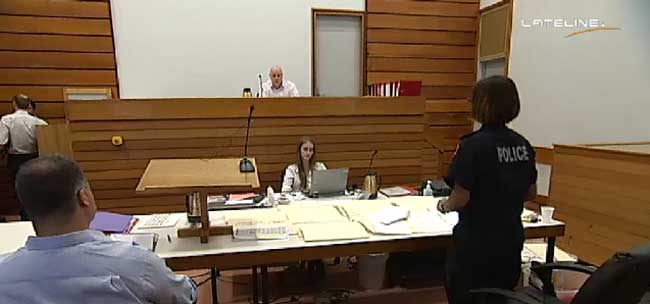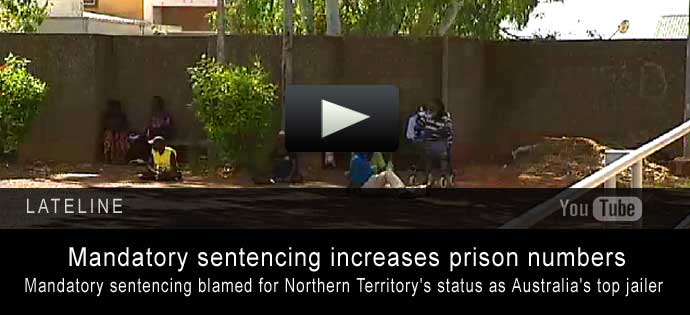Mandatory sentencing blamed for Northern Territory's status as Australia's top jailer
Senior lawyers in the Northern Territory are objecting to new mandatory sentencing laws which they say are contributing to a surge of prisoners into Territory's jails. The Territory not only leads Australia, but also comes third in global rankings after the US and China for the rate at which it puts people behind bars. Lateline's Ginny Stein was granted rare permission to film in a remote court to witness the legal system at work on the proviso defendants weren't identified.
Lateline by Ginny Stein 28 May 2014
jump to: LATELINE TRANSCRIPT
Senior members of the Northern Territory's legal fraternity are warning that mandatory sentencing in the Territory has negative effects, particularly on the Aboriginal community.
The NT leads not just Australia, but comes third in global rankings, after the United States and China, in terms of locking people behind bars.
Earlier this year the Territory Government increased minimum jail time for offenders while restricting judges' right to suspend sentences for certain offences.
Under the new laws, every first-time offender convicted of a violent offence faces three months in jail, and repeat offenders receive a 12-month sentence.
Across the country Indigenous people comprise more than a quarter of the prison population but in the Northern Territory it is closer to 90 per cent.
Vince Kelly, president of the Northern Territory Police Association, says those statistics are "depressing".

Mandatory sentencing increases prison numbers
"Well I think those statistics at one level are pretty depressing. The fact of the matter is that we continue to fill the jails up. As I say the NT police, we are good at our job," he said.
"Has the NT community or society benefited from arresting people at that rate over the last 25 years? I guess [that's] a real question there.
"I think if you ask any operational cop out on the street, 'have things vastly changed?', particularly those of us who have been around 20-25 years would probably [say] no."
Mandatory sentencing targets biff merchants: Attorney-General
NT Attorney-General and former police officer John Elferink was the driving force behind the reintroduction of mandatory sentencing, and says the laws are necessary.
"We have run a number of what are called controversial policies, and they are controversial because they have said to individuals: 'you will be accountable for your actions'," Mr Elferink said.
We get criticised... because there is a significant number of Aboriginal people in custody... on the other side we are told you might be too lenient in terms of violent conduct.
Greg Smith, Northern Territory Magistrate
"And we have introduced mandatory sentencing for those biff merchants that go around the community thumping people."
But Priscilla Collins, chief executive of the North Australian Aboriginal Justice Agency, says there should be alternatives to prison sentencing.
"Yes, there are people who definitely do need to go to jail and we do agree with that. But when you've got at least 50 per cent of them in there for six months or less for minor offences, why are taxpayers paying $110,00 a year to keep them there?" she said.
NT Magistrate Greg Smith says it can be a difficult decision to make.
"We get criticised on one side of the fence because there is a significant number of Aboriginal people in custody," he said.
"On the other side we are told you might be too lenient in terms of violent conduct, so you are sort of caught between those two issues."
Police prosecutor Sergeant Erica Sims says the mandatory sentencing is not effective in deterring violent crime.
"No, it doesn't deter offenders generally, and sometimes it bares no consequence in relation to offenders who are sentenced … that come back and simply reoffend," she said.
"I think, not only as a police officer but as a prosecutor, education and rehabilitation type courses would significantly impact on the type of offending that occurs within this jurisdiction."
Mandatory sentencing increases prison numbers
By Ginny Stein ABC Lateline
Senior lawyers in the Northern Territory are objecting to new mandatory sentencing laws which they say are contributing to a surge in the number of prisoners in the Territory which rates third in the world behind China and the US for its incarceration rate.

Mandatory sentencing increases prison numbers
TRANSCRIPT
TONY JONES, PRESENTER: Senior lawyers in the Northern Territory are objecting to new mandatory sentencing laws which they say are contributing to a surge of prisoners into Territory's jails. The Territory not only leads Australia, but also comes third in global rankings after the US and China for the rate at which it puts people behind bars. Lateline's Ginny Stein was granted rare permission to film in a remote court to witness the legal system at work on the proviso defendants weren't identified.
GINNY STEIN, REPORTER: Today is looking like business as usual in the Nhulunbuy Local Court.
GREG SMITH, NT MAGISTRATE: (Reading from documents) Assault, resist, disorderly, assault, drink driving, assault, assault, disorderly, assault.
GINNY STEIN: More than 80 cases listed, many with multiple charges. The two defence lawyers in court are going to have to move fast.
DANIEL BRIGGS, LAWYER, NT ABORIGINAL JUSTICE AGENCY: It's quite quick. It's quite often described as the sausage factory.
GINNY STEIN: Nhulunbuy, at the top of Australia, is an isolated mining town on the wane, built on Aboriginal land.
Earlier this year the Territory Government increased minimum jail times for offenders while restricting judge's rights to suspend sentences for certain crimes.
Today, a young woman and mother of four we'll call "Gloria" is facing jail.
She has admitted to drunkenly hitting another woman who taunted her about the death of her mother.
Under the Territory's new laws, every first-time offender convicted of a violent offence faces three months in jail. It's 12 months for repeat offenders. Magistrates' hands have been tied.
This is a tough case for all involved. "Gloria" has only appeared in court once before for a minor offence.
Before the new laws were brought in, she most likely would have been released with a fine.
The Northern Territory has the highest imprisonment rate in the country. Mandatory sentencing has led to a further increase in the numbers of Aboriginal people being sentenced to jail.
Across the country, Indigenous people comprise more than a quarter of the prison population, but in the Northern Territory, it's closer to 90 per cent.
VINCE KELLY, PRESIDENT, NT POLICE ASSOCIATION: I think those statistics are at one level pretty depressing. The fact of the matter is that we continue to fill the jails up.
GINNY STEIN: But now, even amongst those called on to enforce the law, there is growing disquiet about the Territory's approach to justice.
VINCE KELLY: I think if you'd asked any operational cop out on the street, "Have things vastly changed?," particularly those of us who've been around for 20, 25 years, the answer would probably be no.
GINNY STEIN: The Northern Territory's Attorney-General was the driving force behind the reintroduction of mandatory sentencing. A former policeman, John Elferink began his policing career in remote Aboriginal communities.
JOHN ELFERINK, NT ATTORNEY-GENERAL: We have run a number of what are called controversial policies and they are controversial because they have said to individuals, "You will be accountable for your actions." And we have introduced mandatory sentencing for those biff merchants that go around in the community thumping people.
PRISCILLA COLLINS, CEO, NT ABORIGINAL JUSTICE AGENCY: Yes, there are people who definitely do need to go to jail, you know, and we do agree with that. But when you've got at least 50 per cent are in there for six months or less for minor offences, why are taxpayers paying $110,000 a year to keep them there? Why aren't there alternatives to prison?
GINNY STEIN: For Magistrate Greg Smith, deciding the fate of one woman with the limits already set is no easy matter.
GREG SMITH: We get criticised on one side of the fence because there is a significant number of Aboriginal people in custody. On the other side we're told you might be too lenient in terms of violent conduct. So, you're sort of caught between those two issues.
GINNY STEIN: Are you troubled by it? I mean, your hands are tied by this.
GREG SMITH: I am, I am. It's one of those matters where it's not as bad as it might have been, but whenever you've got those circumstances where your sense is that you would have done something a little different, then it's troubling if you're required to sentence someone to three months when you might have kept it to a month or two months. Now, those are not big figures, but in the lives of individuals, they do make a difference.
GINNY STEIN: Daniel Briggs believes that far from helping, mandatory sentencing is making things worse for both individuals and the community.
DANIEL BRIGGS: It's a young woman who has no real trouble before in her life. I just don't see how incarcerating her is going to benefit the community, how it's going to benefit her or her family. I don't see how it's going to be a specific deterrent to her.
GINNY STEIN: And for once, adversaries in court appear to be in agreement.
ERICA SIMS, NT POLICE PROSECUTOR: No, it doesn't deter offenders generally and sometimes it bears no consequence in relation to offenders who are sentenced. They come back and simply reoffend again.
GINNY STEIN: Do you have heart about what's going on in the community? Do you think things can get better?
ERICA SIMS: Absolutely. I think as a - as not only a police officer, but as a prosecutor, education and rehabilitation type courses would significantly impact on the type of offending that occurs within this jurisdiction.
GINNY STEIN: And is there enough of that?
ERICA SIMS: Ah - I don't think there is.
GINNY STEIN: With no exceptional circumstances offered, Magistrate Smith the next day handed down his sentence: three months, as mandated by Parliament.
It's now up to "Gloria's" family to care for her children, including her two-year-old son while she's locked up inside.
Ginny Stein, Lateline.


